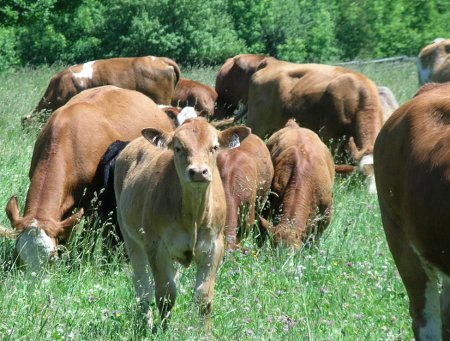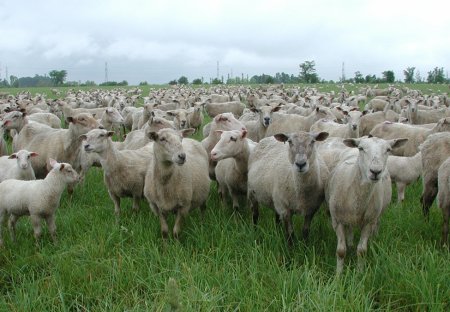Animal health: Listeriosis
Learn about the cause, clinical signs, treatment, prevention, management and transmission to humans of listeriosis.
ISSN 1198-712X, Published January 2013
Listeriosis is a disease that affects a variety of animals and can cause neurological problems, abortion and other symptoms. People are also susceptible to listeriosis infection from consuming contaminated food and have to take precautions to stay healthy.
Cause
Listeria monocytogenes is the bacterium that causes listeriosis. It is found throughout the environment, especially in soil, manure and spoiled silage or hay. Outbreaks are usually associated with some kind of stress, such as poor-quality feed or sudden changes in weather. The bacteria can also be present in the feces of healthy, unaffected animals and people.
Clinical signs
Listeriosis usually affects ruminants such as cattle (Figure 1), sheep and goats, and causes a range of clinical signs in these animals. Affected animals will have a fever and a poor appetite and will appear depressed. Some animals may have paralyzed face muscles. In some cases, the animal may be uncoordinated, may walk in a circle with its neck twisted to one side or may press its head against a solid surface.

Animals in the late stages of pregnancy may abort or give birth to stillborns. Some animals die from the disease. In rare cases, mastitis or pinkeye can occur.
Birds, such as chickens, turkeys, geese, ducks, canaries and parrots can also be infected by listeriosis. Birds may show no signs of disease or may be depressed, paralyzed or may die suddenly. Some birds may also have diarrhea.
Listeriosis can also affect rabbits, especially pregnant does, as well as pigs, dogs and cats. These animals will have a fever and a poor appetite, will appear depressed and may have diarrhea or respiratory problems.
Treatment
A veterinarian can diagnose listeriosis and prescribe antibiotics for infected animals. Treatment may not be successful in the later stages of the disease.
Prevention and management
Control of listeriosis is difficult, as the bacteria are present throughout the environment (Figure 2). Avoid feeding spoiled silage to animals. Separate sick animals from the herd and examine them promptly.

Transmission to humans
Listeriosis is not directly transmissible from animals to humans. However, in rare situations, outbreaks of listeriosis occur in humans. People become infected with the bacteria through eating contaminated vegetables, consuming unpasteurized milk or milk products, and through improperly cooked meats or foods contaminated after processing, such as hot dogs, deli meats and cheese. The bacteria survive at refrigerator temperature ranges. Discard foods that are past their "best before" date, and properly wash and prepare all foods.
Symptoms may start suddenly and include vomiting, nausea, cramps, diarrhea, constipation, severe headache or fever. Some infections may become severe and develop into an infection of the brain, leading to neurological signs. The disease can also result in a loss of pregnancy. Some people experience only mild, flu-like symptoms. Pregnant women, people with weakened immune symptoms, the young and the elderly are highly susceptible to listeriosis.
Reporting
Veterinary laboratories in Ontario and veterinarians who use a laboratory outside of Ontario must report cases of listeriosis to the Ontario Ministry of Agriculture, Food and Rural Affairs (OMAFRA). OMAFRA will monitor and ensure that the disease is kept under control.
For more information on animal health, go to Ontario.ca/animalhealth.